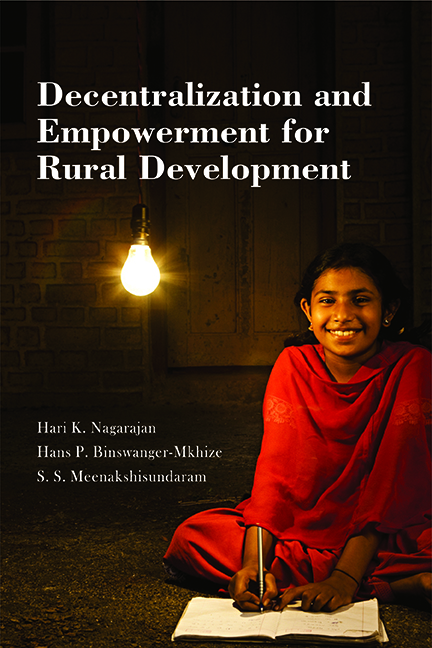Book contents
- Frontmatter
- Contents
- List of Tables and Figures
- Foreword 1
- Foreword 2
- Preface
- 1 Introduction
- 2 Decentralization: Cross-country Experiences
- 3 Thinking about Decentralization in India: 73rd Amendment and Beyond
- 4 Literature
- 5 An Overview of the Data
- 6 Analytical Approaches and Econometric Methods Used
- 7 Can Panchayats Improve the Quality of Services? Some Qualitative Evidence
- 8 Impact of Political Reservations for Women in Panchayats
- 9 Importance of Individual Empowerment of Women
- 10 Governance, Service Provision and Development Outcomes
- 11 The Impact of Fiscal Grants on Tax Efforts of Village Panchayats
- 12 Incidence of Identity-based Voting and Bribes in Panchayats
- 13 Panchayats and Household Vulnerability
- 14 Key Findings, Conclusions and Policy Recommendations
- References
- Index
- About the Authors
Preface
Published online by Cambridge University Press: 30 November 2022
- Frontmatter
- Contents
- List of Tables and Figures
- Foreword 1
- Foreword 2
- Preface
- 1 Introduction
- 2 Decentralization: Cross-country Experiences
- 3 Thinking about Decentralization in India: 73rd Amendment and Beyond
- 4 Literature
- 5 An Overview of the Data
- 6 Analytical Approaches and Econometric Methods Used
- 7 Can Panchayats Improve the Quality of Services? Some Qualitative Evidence
- 8 Impact of Political Reservations for Women in Panchayats
- 9 Importance of Individual Empowerment of Women
- 10 Governance, Service Provision and Development Outcomes
- 11 The Impact of Fiscal Grants on Tax Efforts of Village Panchayats
- 12 Incidence of Identity-based Voting and Bribes in Panchayats
- 13 Panchayats and Household Vulnerability
- 14 Key Findings, Conclusions and Policy Recommendations
- References
- Index
- About the Authors
Summary
The research contained in this book has been motivated by a seminal paper by Foster and Rosenzweig (2001) on how democracy influences the level, growth and distribution of economic resources. Central to this debate is the question of whether and to what extent democratization helps to alleviate poverty by serving the interests of the poor. On one hand, it has been argued that increased democratization promotes the welfare of the poor by improving flows of information between citizens and policymakers, and by increasing the accountability of policymakers to poor and low-status individuals. On the other hand, it has been suggested that democratization may adversely affect the welfare of the poor by increasing rent-seeking behaviour and distributing decision-making to relatively uninformed individuals, thereby shifting public resources from those with fewer private resources. Their book uses a unique panel of villages and households (the ARIS/REDS data sets) and examines some of the effects of deepening democracy in rural India. It shows that a shift towards democracy results in the implementation of outcomes that serves to reduce poverty and inequality. The outcomes are not necessarily firstbest outcomes.
The research in this book is intellectually indebted to this paper. It takes democratization at the local level as given and explores the different mechanisms and outcomes associated with local democratization (henceforth decentralization) in rural India and focuses on empowerment, service provision and the general well-being of households. By using the extremely rich NCAER-REDS panel data set, it is able to show not just correlations of the mechanisms with the impacts, but rather their causal impacts.
There are many institutions, individuals and groups whom I wish to acknowledge and thank both individually and on behalf of my co-authors.
This research was made possible by a grant from IDRC to NCAER (‘Building Policy Research Capacity for Rural Governance and Growth in India’ (grant number 105223). IDRC was the only grant making institution that recognized the importance of informed research based on economic theory for making policy. I wish to thank Stephen McGurk and Evan Due for taking an affirmative decision to fund this grant proposal and continued support.
- Type
- Chapter
- Information
- Decentralization and Empowerment for Rural Development , pp. xv - xviiiPublisher: Foundation BooksPrint publication year: 2014



